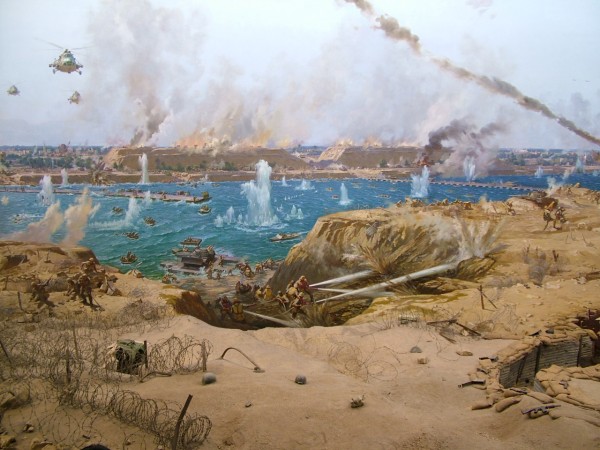![The 6th of October War is a classic example of an event that has been subject to competing narratives of history [Marked for re-use]](http://www.auccaravan.com/wp-content/uploads/2016/12/The_Crossing_of_Suez-e1481107564229.jpg)
@YasmeenShaheenn @HayaElSayed
Political intolerance and singular interpretations of history have a longstanding place in the Egyptian tradition of education.
Ever since the Ottoman and Mameluke eras, public education has shifted to instill a historiographical understanding of events that is aligned with the government’s own agenda.
Across the educational platform in Egypt, but more so in public schools, there is a tendency towards avoiding endorsing overtly critical attitudes of the government.
Although the late President Gamal Abdel Nasser’s administration believed education to be the driving force behind its modernization goals, the system nevertheless remained very influenced by the government.
The government centralized the education system to ensure there was no deviation from its specific and directed political narratives.
Accordingly, when it comes to recording history, drawing the borderlines, and structuring the political content of the state, the regime makes sure to release what would promote political stability and the superiority of the state.
“All regimes, especially dictatorial ones, need a founding myth regarding national identity and national glories,” Ashraf El-Sherif, associate professor of political science, told The Caravan.
History, social studies and even religion all become highly politicized subjects that are charged with state-sponsored rhetoric.
“This process is artificially constructed and inculcated into people via an all-encompassing program of indoctrination and acculturation in education and mass media,” El-Sherif added.
In schools, students are taught that questioning what history has imposed on them disgraces them from being purely “Egyptian”.
“Whoever critically questions the historicity of these myths is castigated and outlasted as unpatriotic or [a] foreign agent, an outsider or simply immoral and unethical,” he added.
Over the years, the state increasingly determined what students learned about their country’s history.
In 2003, the former Minister of Education Hussein Kamel Bahaeddin justified the state’s control of education by clarifying that this would safeguard the state from “enculturation and socialization,” and thus achieve national unity.
After the 2011 uprising, the Ministry of Education insisted on cutting off almost 20 percent of the educational content that was oriented towards the successes and legacy of the dissolved National Democratic Party (NDP) from the national curricula.
Egypt’s fraying political sphere has become increasingly charged following the Arab Spring.
And ever since, there have been clear divisions found within the state. Many remain pro-government, while others rebelled against the system.
“We are forced to memorize. We are obliged to know only what they want us to know. We do not have the right to argue or question if what they tell us is true or not under the false pretext that this is extremely dangerous to the state’s stability on the long-run,” said Mai Adel, a year 11 Egyptian Pioneers School student.
The emphasis of high schools, especially public ones, is towards covering textbook material instead of encouraging creative and independent thinking.
This leaves very little room for more creative expressions of original thought.
“The government must notice that such a technique of imposing history on our children should not be in practice. The reason behind the January 25 Revolution was to raise political awareness, not to confine our children to one theory that can be easily falsified,” said Eva Shoukry, a mother of three students in Happy World School.
Nevertheless, some students still believe that through these means of control the government is able to maintain order within the state.
“This educational system is a good one. It will guarantee that extremists will find no access to penetrate into our thoughts because we all get to know the same thing about our country’s history and politics; therefore, we will all be on the same track of thought,” argued Youssef Mohab, a year 10 pupil at the International School of Egypt.
On the other hand, some parents believe that this technique is valid in order to maintain security and order; otherwise, there would be a menace against the long established security of Egypt.
“Once the system is allowed to be questioned in terms of its policies and history, it will ultimately lose the respect it was granted.
Our government is looked upon as a superior body and institution that should never be shaken,” said Omaima Hussein, a mother of three high school graduates.
